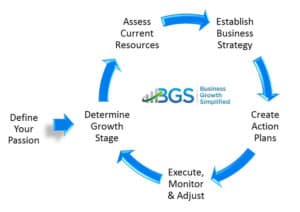 Strategy execution is a current theme at Your Small Business Growth. So, I have been giving strategy execution a lot of thought. There have been lots of connections that I have made as I think through this with my associates.
Strategy execution is a current theme at Your Small Business Growth. So, I have been giving strategy execution a lot of thought. There have been lots of connections that I have made as I think through this with my associates.
One of the big connections has helped me solidify why strategy execution has come so easily to me over the years. To understand my “ah ha moment” you’ll need to understand a little of my background.
I started out my career as a missile launch officer. So, systems, checklists, and discipline were a part of my life for 4 long years. During this period I also got my MBA from the University of Missouri in information system and decided this was what I wanted to do next in my career.
My next assignment was as an Air Force acquisition manager. It was here where I was indoctrinated into the world of BIG project management (PM). I received my PM certification from the Defense System Management College (DSMC) which is where program managers are sent to learn to manage billion dollar projects. My first project was a $22 million command and control system software development project.
In 1991 I got out of the Air Force to start my consulting practice. The early days of my consulting career was focused on managing system implementations and process improvement projects for companies both large and small.
So, you can see I was in the business of strategy execution nearly all my career. When I made the transition into the executive office back in 1998, I realized that my skill of execution combined with my ability to facilitate strategy development was a good combination. I was in a good place – right?
 Well, yes and no. It doesn’t do me any good if my clients don’t realize the importance of these skills. And, if I want to make my clients successful I need to transfer my knowledge and ability to them! That’s why the SPARC framework was born.
Well, yes and no. It doesn’t do me any good if my clients don’t realize the importance of these skills. And, if I want to make my clients successful I need to transfer my knowledge and ability to them! That’s why the SPARC framework was born.
The first 5 stages of the process are pretty classic strategic planning. It’s the 6th step that makes it unique. Step 6 is all about executing on what you’ve decide takes you in the direction you want to go!
But, how do I teach others how to do this. Then it hit me, the same way that I learned, through good PM training and application!!!
That’s right strategy execution is nothing more than good sound project management. But, PM is more than most people realize.
Most people think of PM as estimating, planning and creating Gantt charts. But the discipline of PM is much more than this. It is the combination of 3 critical skillsets:
- Business analysis
- Task management
- Leadership
We’ll take a close look at each of these skill sets later in more depth. For now let’s just look at the basic purpose of each.
Business analysis is the set of skills of problem solving. That is the ability to look at a situation, determine the “root cause” problem or opportunity available and formulate a solution to address the problem or take advantage of the opportunity.
Task management is what most people connect with PM. This is where the work is defined, schedules are created, resources applied, and monitoring progress so the objective(s) is achieved. Sound familiar? It should, it’s just business management applied to a project or set of projects which is very much a part of implementing any strategy.
Finally, leadership is the skills associated with communicating and motivating a team toward a desired result. In this case it is the project(s) objectives, and as a business grows the number of project and people involved grows to a point which you need to manage a portfolio of projects better known in the project management world as project portfolio management or (PPM).
Can you see the connection between these 3 skillsets and the work you have in front of you to grow your business? Where do you feel strongest? Where do you feel you need some help in doing it or gaining the skills necessary to manage your company’s growth yourself?
I hope you realize the importance of learning these things. The one thing that I see hold small businesses back most frequently is an owners lack of skills necessary to take their business to the next level. This is where DE, Inc. is focused. Our business resources, business tools, and business training are meant to help you improve your skills so that you can grow your business to a point where it sustains itself. Are you ready to get started?






Leave A Comment